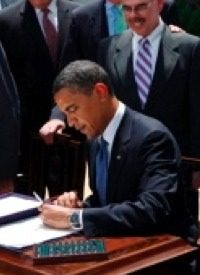
President Obama acknowledged his own struggle with smoking, and said, “I know how difficult it can be when you get started at a young age.” Americans also apparently understand the difficulty and would rather not have the federal government intrude on their personal decisions. A Gallup Poll released on June 22 found that 52 percent of Americans oppose the legislation while 46 percent support it.
Strangely, Philip Morris USA, America’s largest cigarette company, called the legislation “an important step forward.” Competitors of Philip Morris charge that the company’s involvement with drafting the legislation was designed to keep it in the dominant position by limiting advertising opportunities for all brands. Lesser-known brands rely on advertising to gain market share from leading brands, so Philip Morris stands to gain from less overall marketing. This does show the danger that federal interference in the marketplace can work to the benefit of special interest groups.
Congressman Ron Paul (R-Texas) noted in his weekly “Texas Straight Talk” column posted on June 15 that this federal interference is also “Moving Towards Tobacco Prohibition.” Regarding the law that President Obama has since signed, Congressman Paul, himself a physician, made these insightful remarks: “It’s always the case that when your liberty is seized, it is seized for your own good. Such is the condescension of Washington.” Noting that state legislatures are the proper venue for regulations regarding the marketing and sale of tobacco products to minors, Paul summarized the constitutionally correct point of view: “Other than ensuring that tobacco companies do not engage in force or fraud to market their products, the federal government needs to stay out of the health habits of free people.”
Dr. Paul notes that his objections to the bill “are not an endorsement of tobacco.” As a physician, he is well aware of the harmful effects of smoking, yet he recognizes it as a personal choice. While the choice may lead to a bad habit, “the way to combat poor choices is through education and information,” not by trying to take away the choice through regulation.
For many decades, federal regulation used to favor tobacco farmers with subsidies. Then the subsidies were taken from them. Now the government is enacting legislation that could hurt them or put them out of business. Welcome to the bizarro world of unconstitutional interference in the free market. Once Uncle Sam, or perhaps Auntie Samantha, is allowed to start running a Nanny State, the government gets to decide what is good for its citizens personally and professionally. Within a short time, a person’s choice of habits or way of life can go from federally favored to disfavored to discriminated against.
The only answer is to limit federal government to its constitutionally authorized role that entails national defense, international relations, and not a whole lot more (the actual federal powers are enumerated in the Constitution). The Founding Fathers realized that state and local governments would be more responsive to the needs of their citizens than the distant Washington bureaucracy, and they wisely left almost all regulatory authority in state and local hands. In the worst case scenario, Americans would then be free to move to another city or even another state to find a more responsive government. On the other hand, when Washington decrees something, there is no escape.
Imagine what could happen if a national, public insurance option controlled by the federal government were to be enacted. The federal government would be able to put sharper teeth behind its Nanny State efforts, raising premiums and deductibles for any behavior it deemed undesirable, and it could limit or deny coverage if the person has engaged in unacceptable behavior. As Dr. Paul said, this will begin with something that is supposedly for our own good, like not smoking, but the government will gladly expand this power to what it claims is for the common good. Eventually government will just do what is for its own good while claiming that it is making sure every citizen does his patriotic duty.
Recall George Orwell’s 1984 and how Winston Smith had to perform his compulsory exercise routine before the two-way telescreen; the onscreen instructions even addressed him directly by his coded number and name and told him to pay more attention. It was, after all, the best way for Big Brother to limit the cost of healthcare.
Photo: AP Images



